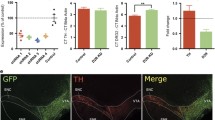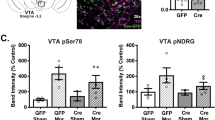Abstract
Rationale
The Netrin-1/DCC guidance cue pathway is critically involved in the adolescent organization of the mesocorticolimbic dopamine circuitry. Adult mice heterozygous for Dcc show reduced dopamine release in the nucleus accumbens in response to amphetamine and, in turn, blunted sensitivity to the rewarding effects of this drug.
Objective
Here, we tested whether the protective effects of Dcc haploinsufficiency are specific to stimulant drugs of abuse or instead extrapolate to opioids and ethanol.
Methods
We used the place preference paradigm to measure the rewarding effects of cocaine (20 mg/kg), morphine (5 or 10 mg/Kg), or ethanol (20%) in adult (PND 75) male Dcc haploinsufficient mice or their wild-type litter mates. In a second experiment, we compared in these two genotypes, in vivo dopamine release in the nucleus accumbens after a single i.p. injection of morphine (10 mg/kg).
Results
We found reduced morphine-induced dopamine release in the nucleus accumbens of Dcc haploinsufficient male mice, but, contrary to the effects of stimulant drugs, there is no effect of genotype on morphine-induced conditioned preference.
Conclusion
These findings show that reduced drug-induced mesolimbic dopamine in Dcc haploinsufficient male mice protects specifically against the rewarding effects of stimulant drugs, but not against the rewarding properties of morphine and ethanol. These results suggest that these drugs exert their rewarding effect via different brain circuits.




Similar content being viewed by others
Data availability
The data that support the findings of this study are available on request from the corresponding author.
References
Badiani A, Caprioli D, De Pirro S (2019) Opposite environmental gating of the experienced utility (‘liking’) and decision utility (‘wanting’) of heroin versus cocaine in animals and humans: implications for computational neuroscience. Psychopharmacology 236:2451–2471. https://doi.org/10.1007/s00213-019-05318-9
Badiani A, Belin D, Epstein D, Calu D, Shaham Y (2011) Opiate versus psychostimulant addiction: the differences do matter. Nat Rev Neurosci 12:685–700. https://doi.org/10.1038/nrn3104
Ben Hamida S, Mendonça-Netto S, Arefin TM, Nasseef MT, Boulos L-J, McNicholas M et al (2018) Increased alcohol seeking in mice lacking Gpr88 involves dysfunctional mesocorticolimbic networks. Biol Psychiatry 84:202–212. https://doi.org/10.1016/j.biopsych.2018.01.026
Darcq E, Koebel P, Del Boca C, Pannetier S, Kirstetter A-S, Garnier J-M et al (2011) RSK2 signaling in brain habenula contributes to place aversion learning. Learn Mem 18:574–578. https://doi.org/10.1101/lm.2221011
Ettenberg A, Pettit HO, Bloom FE, Koob GF (1982) Heroin and cocaine intravenous self-administration in rats: mediation by separate neural systems. Psychopharmacology 78:204–209. https://doi.org/10.1007/BF00428151
Fields HL, Margolis EB (2015) Understanding opioid reward. Trends Neurosci 38:217–225. https://doi.org/10.1016/j.tins.2015.01.002
Flores C (2011) Role of netrin-1 in the organization and function of the mesocorticolimbic dopamine system. J Psychiatry Neurosci 36:296–310. https://doi.org/10.1503/jpn.100171
Flores C, Manitt C, Rodaros D, Thompson KM, Rajabi H, Luk KC et al (2005) Netrin receptor deficient mice exhibit functional reorganization of dopaminergic systems and do not sensitize to amphetamine. Mol Psychiatry 10:606–612. https://doi.org/10.1038/sj.mp.4001607
Franklin KBJ and Paxinos G (2007) The mouse brain in stereotaxic coordinates. Paperback
Fujita M, Ide S, Ikeda K (2019) Opioid and nondopamine reward circuitry and state-dependent mechanisms. Ann N Y Acad Sci 1451:29–41. https://doi.org/10.1111/nyas.13605
Gad JM, Keeling SL, Wilks AF, Tan S-S, Cooper HM (1997) The expression patterns of guidance receptors, dcc and neogenin, are spatially and temporally distinct throughout mouse embryogenesis. Dev Biol 192:258–273. https://doi.org/10.1006/dbio.1997.8756
Gavériaux-Ruff C, Kieffer BL (2002) Opioid receptor genes inactivated in mice: the highlights. Neuropeptides 36:62–71. https://doi.org/10.1054/npep.2002.0900
Grant A, Hoops D, Labelle-Dumais C, Prévost M, Rajabi H, Kolb B et al (2007) Netrin-1 receptor-deficient mice show enhanced mesocortical dopamine transmission and blunted behavioural responses to amphetamine. Eur J Neurosci 26:3215–3228. https://doi.org/10.1111/j.1460-9568.2007.05888.x
Grant A, Speed Z, Labelle-Dumais C, Flores C (2009) Post-pubertal emergence of a dopamine phenotype in netrin-1 receptor-deficient mice. Eur J Neurosci 30:1318–1328. https://doi.org/10.1111/j.1460-9568.2009.06919.x
Harter PN, Bunz B, Dietz K, Hoffmann K, Meyermann R, Mittelbronn M (2010) Spatio-temporal deleted in colorectal cancer (DCC) and netrin-1 expression in human foetal brain development. Neuropathol Appl Neurobiol 36:623–635. https://doi.org/10.1111/j.1365-2990.2010.01100.x
Herz A (1997) Endogenous opioid systems and alcohol addiction. Psychopharmacol 129:99–111. https://doi.org/10.1007/s002130050169
Hnasko TS, Sotak BN, Palmiter RD (2005) Morphine reward in dopamine-deficient mice. Nature 438:854–857. https://doi.org/10.1038/nature04172
Hoops D, Flores C (2017) Making dopamine connections in adolescence. Trends Neurosci 40:709–719. https://doi.org/10.1016/j.tins.2017.09.004
Hoops D, Reynolds LM, Restrepo-Lozano JM, Flores C (2018) Dopamine development in the mouse orbital prefrontal cortex is protracted and sensitive to amphetamine in adolescence. eNeuro 5 ENEURO.0372–17.2017. https://doi.org/10.1523/ENEURO.0372-17.2017
Johnston KJA, Ward J, Ray PR, Adams MJ, McIntosh AM, Smith BH et al (2021) Sex-stratified genome-wide association study of multisite chronic pain in UK Biobank. PLOS Genet 17:e1009428. https://doi.org/10.1371/journal.pgen.1009428
Kamdar NK, Miller SA, Syed YM, Bhayana R, Gupta T, Rhodes JS (2007) Acute effects of Naltrexone and GBR 12909 on ethanol drinking-in-the-dark in C57BL/6J mice. Psychopharmacol 192:207–217. https://doi.org/10.1007/s00213-007-0711-5
Kim JH, Lavan D, Chen N, Flores C, Cooper H, Lawrence AJ (2013) Netrin-1 receptor-deficient mice show age-specific impairment in drug-induced locomotor hyperactivity but still self-administer methamphetamine. Psychopharmacol 230:607–616. https://doi.org/10.1007/s00213-013-3187-5
Lasek AW, Janak PH, He L, Whistler JL, Heberlein U (2007) Downregulation of mu opioid receptor by RNA interference in the ventral tegmental area reduces ethanol consumption in mice. Genes, Brain Behav 6:728–735. https://doi.org/10.1111/j.1601-183X.2007.00303.x
Le Merrer J, Plaza-Zabala A, Del Boca C, Matifas A, Maldonado R, Kieffer BL (2011) Deletion of the δ opioid receptor gene impairs place conditioning but preserves morphine reinforcement. Biol Psychiatry 69:700–703. https://doi.org/10.1016/j.biopsych.2010.10.021
Li Y, Kolb B, Robinson TE (2003) The location of persistent amphetamine-induced changes in the density of dendritic spines on medium spiny neurons in the nucleus accumbens and caudate-putamen. Neuropsychopharmacol 28:1082–1085. https://doi.org/10.1038/sj.npp.1300115
Liang D-Y, Zheng M, Sun Y, Sahbaie P, Low SA, Peltz G et al (2014) The Netrin-1 receptor DCC is a regulator of maladaptive responses to chronic morphine administration. BMC Genomics 15:345. https://doi.org/10.1186/1471-2164-15-345
Manitt C, Eng C, Pokinko M, Ryan RT, Torres-Berrío A, Lopez JP et al (2013) dcc orchestrates the development of the prefrontal cortex during adolescence and is altered in psychiatric patients. Transl Psychiatry 3:e338. https://doi.org/10.1038/tp.2013.105
Manitt C, Labelle-Dumais C, Eng C, Grant A, Mimee A, Stroh T et al (2010) Peri-pubertal emergence of UNC-5 homologue expression by dopamine neurons in rodents. PLoS ONE 5:e11463. https://doi.org/10.1371/journal.pone.0011463
Nader K, van der Kooy D (1997) Deprivation state switches the neurobiological substrates mediating opiate reward in the ventral tegmental area. J Neurosci 17:383–390. https://doi.org/10.1523/JNEUROSCI.17-01-00383.1997
Osborne PB, Halliday GM, Cooper HM, Keast JR (2005) Localization of immunoreactivity for deleted in colorectal cancer (DCC), the receptor for the guidance factor netrin-1, in ventral tier dopamine projection pathways in adult rodents. Neuroscience 131:671–681. https://doi.org/10.1016/j.neuroscience.2004.11.043
Pettit HO, Ettenberg A, Bloom FE, Koob GF (1984) Destruction of dopamine in the nucleus accumbens selectively attenuates cocaine but not heroin self-administration in rats. Psychopharmacol 84:167–173. https://doi.org/10.1007/BF00427441
Pokinko M, Moquin L, Torres-Berrío A, Gratton A, Flores C (2015) Resilience to amphetamine in mouse models of netrin-1 haploinsufficiency: role of mesocortical dopamine. Psychopharmacology 232:3719–3729. https://doi.org/10.1007/s00213-015-4032-9
Reynolds LM, Flores C (2021a) Adolescent dopamine development: connecting experience with vulnerability or resilience to psychiatric disease. Neurosci Dev 295–304. https://www.sciencedirect.com/science/article/pii/B9780128179888000269
Reynolds LM, Flores C (2021b) Mesocorticolimbic dopamine pathways across adolescence: diversity in development. Front Neural Circuits 15. https://doi.org/10.3389/fncir.2021.735625
Reynolds LM, Gifuni AJ, McCrea ET, Shizgal P, Flores C (2016) Dcc haploinsufficiency results in blunted sensitivity to cocaine enhancement of reward seeking. Behav Brain Res 298:27–31. https://doi.org/10.1016/j.bbr.2015.05.020
Reynolds LM, Pokinko M, Torres-Berrío A, Cuesta S, Lambert LC, Del Cid Pellitero E et al (2018) DCC receptors drive prefrontal cortex maturation by determining dopamine axon targeting in adolescence. Biol Psychiatry 83:181–192. https://doi.org/10.1016/j.biopsych.2017.06.009
Robinson TE, Gorny G, Savage VR, Kolb B (2002) Widespread but regionally specific effects of experimenter- versus self-administered morphine on dendritic spines in the nucleus accumbens, hippocampus, and neocortex of adult rats. Synapse 46:271–279. https://doi.org/10.1002/syn.10146
Robinson TE, Kolb B (1997) Persistent structural modifications in nucleus accumbens and prefrontal cortex neurons produced by previous experience with amphetamine. J Neurosci 17:8491–8497. https://doi.org/10.1523/JNEUROSCI.17-21-08491.1997
Robinson TE, Kolb B (1999) Alterations in the morphology of dendrites and dendritic spines in the nucleus accumbens and prefrontal cortex following repeated treatment with amphetamine or cocaine. Eur J Neurosci 11:1598–1604. https://doi.org/10.1046/j.1460-9568.1999.00576.x
Russo SJ, Dietz DM, Dumitriu D, Morrison JH, Malenka RC, Nestler EJ (2010) The addicted synapse: mechanisms of synaptic and structural plasticity in nucleus accumbens. Trends Neurosci 33:267–276. https://doi.org/10.1016/j.tins.2010.02.002
Srour M, Rivière JB, Pham JMT, Dubé MP, Girard S, Morin S et al (2010) Mutations in DCC cause congenital mirror movements. Science 328(80):592–592. https://doi.org/10.1126/science.1186463
Vander Weele CM, Porter-Stransky KA, Mabrouk OS, Lovic V, Singer BF, Kennedy RT et al (2014) Rapid dopamine transmission within the nucleus accumbens: dramatic difference between morphine and oxycodone delivery. Eur J Neurosci 40:3041–3054. https://doi.org/10.1111/ejn.12709
Vassilev P, Avvisati R, Koya E, Badiani A (2020) Distinct populations of neurons activated by heroin and cocaine in the striatum as assessed by catFISH. eneuro 7, ENEURO.0394–19.2019. https://doi.org/10.1523/ENEURO.0394-19.2019.
Vosberg DE, Leyton M, Flores C (2019) The Netrin-1/DCC guidance system: dopamine pathway maturation and psychiatric disorders emerging in adolescence. Mol Psychiatry. https://doi.org/10.1038/s41380-019-0561-7
Vosberg DE, Zhang Y, Menegaux A, Chalupa A, Manitt C, Zehntner S et al (2018) Mesocorticolimbic connectivity and volumetric alterations in DCC mutation carriers. J Neurosci 38:4655–4665. https://doi.org/10.1523/JNEUROSCI.3251-17.2018
Yetnikoff L, Eng C, Benning S, Flores C (2010) Netrin-1 receptor in the ventral tegmental area is required for sensitization to amphetamine. Eur J Neurosci 31:1292–1302. https://doi.org/10.1111/j.1460-9568.2010.07163.x
Yetnikoff L, Labelle-Dumais C, Flores C (2007) Regulation of netrin-1 receptors by amphetamine in the adult brain. Neuroscience 150:764–773. https://doi.org/10.1016/j.neuroscience.2007.09.069
Acknowledgements
The authors dedicate this work to the late Dominique Nouel – an excellent and dedicated scientist, a kind mentor and colleague, and a generous and loyal friend.
Funding
The present research was supported by the National Institute on Drug Abuse (# DA037911 to C.F; # DA005010 and # DA048796 to B.L.K.), the Canadian Institutes of Health Research (# FRN 156272 to C.F.), the Natural Sciences and Engineering Research Council of Canada (# RGPIN-2020–04703 to C.F.), the Canada Fund for Innovation and the Canada Research Chairs to E.D. and B.L.K., and the University of Strasbourg initiative of Excellence (to E.D.). We thank Dr. Radu Avramescu for his helpful comments on the manuscript. We thank the NIDA Drug Supply Program (NIH) for providing the morphine.
Author information
Authors and Affiliations
Corresponding author
Ethics declarations
Conflict of interest
The authors declare no competing interests.
Additional information
Publisher's note
Springer Nature remains neutral with regard to jurisdictional claims in published maps and institutional affiliations.
This article belongs to a Special Issue on Conditioned Determinants of Reward Seeking
Rights and permissions
Springer Nature or its licensor (e.g. a society or other partner) holds exclusive rights to this article under a publishing agreement with the author(s) or other rightsholder(s); author self-archiving of the accepted manuscript version of this article is solely governed by the terms of such publishing agreement and applicable law.
About this article
Cite this article
Darcq, E., Nouel, D., Hernandez, G. et al. Reduced dopamine release in Dcc haploinsufficiency male mice abolishes the rewarding effects of cocaine but not those of morphine and ethanol. Psychopharmacology 240, 637–646 (2023). https://doi.org/10.1007/s00213-022-06288-1
Received:
Accepted:
Published:
Issue Date:
DOI: https://doi.org/10.1007/s00213-022-06288-1




